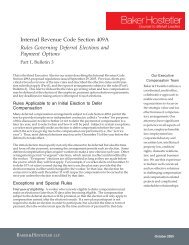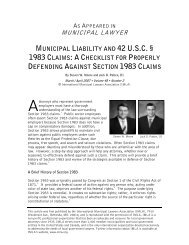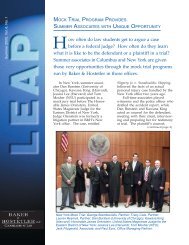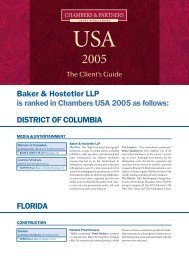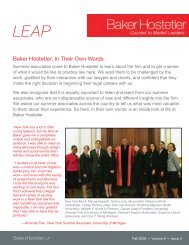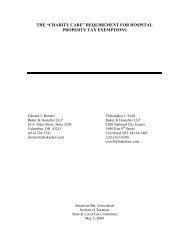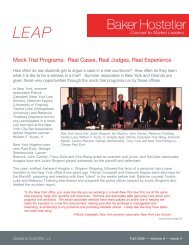Prejudgment Remedies in Texas - Doug D'Arche - Back to Main Page
Prejudgment Remedies in Texas - Doug D'Arche - Back to Main Page
Prejudgment Remedies in Texas - Doug D'Arche - Back to Main Page
- No tags were found...
You also want an ePaper? Increase the reach of your titles
YUMPU automatically turns print PDFs into web optimized ePapers that Google loves.
599. (This differs from a Writ of Sequestration, which requires a Deb<strong>to</strong>r <strong>to</strong> replevy with<strong>in</strong> 10days follow<strong>in</strong>g a levy of a Writ of Sequestration). A Deb<strong>to</strong>r must post a bond with sufficientsurety or sureties as provided by statute. Id. The bond must be <strong>in</strong> the amount fixed by theCourt's Order or, at the Deb<strong>to</strong>r's option, for the value of the property sought <strong>to</strong> be replevied (<strong>to</strong>be estimated by the officer), plus one-year's <strong>in</strong>terest. The bond must be approved by thelevy<strong>in</strong>g officer and filed with the clerk where the action is pend<strong>in</strong>g. Id.Either party may object <strong>to</strong> the other party's bond by mak<strong>in</strong>g a motion <strong>to</strong> <strong>in</strong>crease theamount of the bond or challeng<strong>in</strong>g the sufficiency of the sureties or the estimated value of theproperty. Tex. R. Civ. P. 599. Although the motion may be determ<strong>in</strong>ed from the uncontrovertedaffidavits, it should be anticipated that an evidentiary meet<strong>in</strong>g will be required. Id.d. Substitution of the PropertyOn reasonable notice <strong>to</strong> the oppos<strong>in</strong>g party (which may be less than 3 days), the Deb<strong>to</strong>rmay move for substitution of property. Tex. R. Civ. P. 599. The Court must make f<strong>in</strong>d<strong>in</strong>gs as <strong>to</strong>the value of the property <strong>to</strong> be substituted. Id. If the property is substituted, the propertyreleased from attachment shall be delivered <strong>to</strong> the Deb<strong>to</strong>r and all liens upon such property shallbe term<strong>in</strong>ated. Id. Attachment of the substituted property is deemed <strong>to</strong> have existed from thedate of the levy on the orig<strong>in</strong>al property and this will supercede any subsequent liens. Id.10. Disposition of the PropertyAfter the property has been levied upon under a Writ of Attachment, the Court may actupon affidavits, <strong>in</strong> writ<strong>in</strong>g or oral testimony, with or without notice <strong>to</strong> the parties (depend<strong>in</strong>g uponthe urgency) direct<strong>in</strong>g the levy<strong>in</strong>g officer <strong>to</strong> sell the property at public auction. Tex. R. Civ. P.601. This is appropriate when it appears that the property is <strong>in</strong> danger of serious and immediatewaste or decay or that keep<strong>in</strong>g the property until the trial will <strong>in</strong>cur such expense or deterioration<strong>in</strong> value as <strong>to</strong> gravely lessen the amount likely <strong>to</strong> be realized therefrom. Tex. R. Civ. P. 600. Ifa party other than the Deb<strong>to</strong>r files an Application for Order of Sale, the Order can only begranted if the party files a bond, with two or more good and sufficient sureties, <strong>to</strong> be approvedby the Court, conditioned that it will be responsible <strong>to</strong> the Deb<strong>to</strong>r for such damages as theDeb<strong>to</strong>r may susta<strong>in</strong> <strong>in</strong> case the sale is illegal, unjustly applied for, or if illegally and unjustlymade. Tex. R. Civ. P. 602. The procedure for such sale is generally the same as that under aWrit of Execution. Tex. R. Civ. P. 603. Once the property has been sold, the levy<strong>in</strong>g officershall return the Order of Sale by send<strong>in</strong>g it <strong>to</strong> the Court stat<strong>in</strong>g the time and place of the sale,the name of the purchaser, the amount of money received and an itemized account of theexpenses attend<strong>in</strong>g the sale. Tex. R. Civ. P. 604. The Order must be signed by the levy<strong>in</strong>gofficer and shall be filed with the Court. The sale proceeds that are deposited <strong>in</strong> the Court aresubject <strong>to</strong> the attachment lien. Tex. R. Civ. P. 604; Midway Nat. Bank of Grand Prairie v. West<strong>Texas</strong> Wholesale Co., 447 S.W.2d 709, 711 (Tex. Civ. App.—Fort Worth 1969), writ ref'd n.r.e.,453 S.W.2d 460 (Tex 1970).If the Court does not order the property sold, the property is <strong>to</strong> be held by a levy<strong>in</strong>gofficer until resolution of the underly<strong>in</strong>g issues <strong>in</strong> the lawsuit. Because the levy<strong>in</strong>g officer isentitled <strong>to</strong> recover his reasonable costs, it is possible <strong>to</strong> <strong>in</strong>cur significant charges prior <strong>to</strong> theresolution of the lawsuit. Given the fact that most lawsuits take years before they are f<strong>in</strong>allyresolved, it is entirely likely that the costs for s<strong>to</strong>r<strong>in</strong>g the property will ultimately exceed the valueof the property be<strong>in</strong>g levied upon. Therefore, <strong>in</strong> virtually all cases, the Credi<strong>to</strong>r should arguethat the property will decl<strong>in</strong>e <strong>in</strong> value and should be disposed of, prior <strong>to</strong> trial, <strong>in</strong> order <strong>to</strong>maximize the value realized and reduce as much as possible any <strong>in</strong>debtedness that will rema<strong>in</strong>ow<strong>in</strong>g by the Deb<strong>to</strong>r.<strong>Page</strong> 30 of 36



